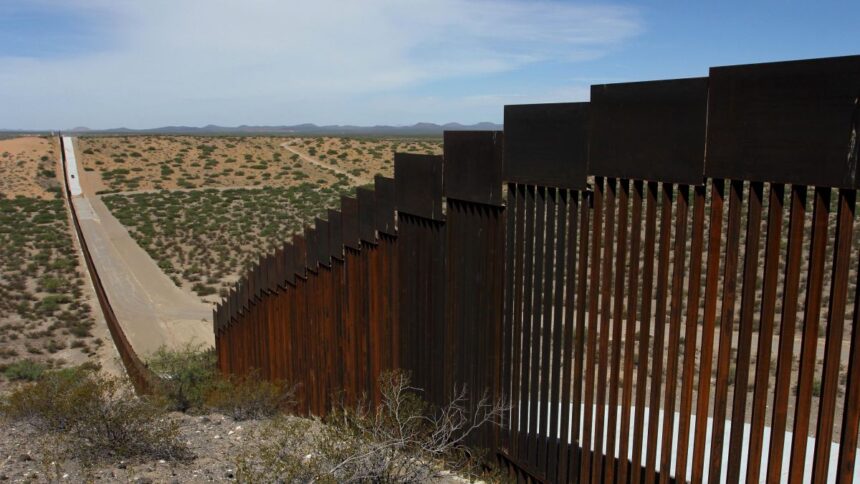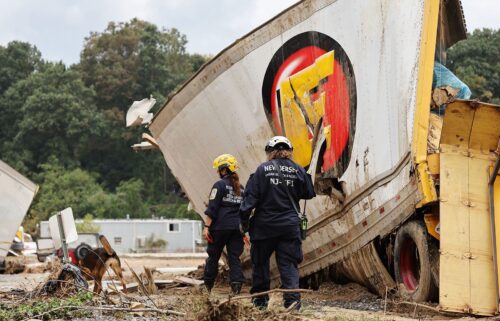Texas landowners facing coronavirus pandemic and land seizures for border wall

(CNN) -- Within the last six months, as the coronavirus pandemic gripped the US, the Trump administration filed 75 lawsuits to seize private land along the US-Mexico border for the border wall, according to data reviewed by CNN from the Texas Civil Rights Project.
In the final days of the presidential election, President Donald Trump, along with senior administration officials, have cited the border wall as a cornerstone accomplishment of his first term.
"Under my leadership, we achieved the most secure border in US history," Trump said at a rally in Arizona Wednesday. "We built almost 400 miles."
But on the other side of that effort is thousands of Texas residents juggling legal challenges and the pandemic.
"People right now are having to choose between their health and their homes," said Ricky Garza, a staff attorney at the Texas Civil Rights Project, a legal advocacy group, which is currently representing landowners in eight land seizure cases.
Between May and October 22, 75 lawsuits to take private land were filed in Texas, up from 17 lawsuits around the same period last year, according to data based on court filings. A US official confirmed to CNN that the administration has been moving at a faster rate to obtain private land to meet the White House's goal.
Generally, the government is allowed to acquire privately owned land for public use, otherwise known as eminent domain. Border barriers built under previous administrations have largely gone up in areas where land was federally owned, but extending the wall, as Trump pledged to, requires taking privately owned land.
The spike in so-called eminent domain lawsuits has been a trend under this administration, as the President tries to hit 450 miles by year's end.
The Rio Grande Valley, where land is largely privately owned and therefore an epicenter of eminent domain cases, has been particularly hard hit by the pandemic. Texas, as a whole, ranks as the number two state in Covid-19 cases.
"The government is choosing to sue people during a pandemic in one of the most vulnerable places in the United States," Garza said. "If there was any sense of concern for the people of south Texas that went through one of the worst public health crises, none of these lawsuits would be filed after March 1, but here we are with dozens."
Many of the people the Texas Civil Rights Project represents are elderly, a population especially vulnerable to the pandemic. While some hearings can be virtual, that's not the default, Garza said, adding that it's up to the presiding judge.
Among those at risk of losing their land is the Cavazos family in south Texas. The roughly 70 acres of land have been passed down from generation to generation, and hold sentimental value, as well as provide for the family's livelihood.
"It was handed down to us by our grandmother... in the early 1950s," said Baudilia "Lilly" Cavazos Rodriguez, one of three siblings, two of whom live on the property. "She bought the land on her own. Being a Hispanic woman, they wouldn't let her sign for it, my uncle and dad signed on it before they went off to World War II."
The family rents some of the property, but the government is seeking to split the land. "We don't want to give it up, we don't want to sell. It's not about money, it's about keeping what our grandmother wanted us to keep," Cavazos Rodriguez said. The acquisition process started at least by April 2018.
A Customs and Border Protection official told CNN that the administration is taking precautions in engaging with landowners during the pandemic, like talking over the phone instead of in person, adding that exceptions have been made on a case-by-case basis. Some landowners willingly have turned over their land.
Eminent domain cases can be lengthy -- ranging from months to years -- though they generally don't keep the agency from being able to proceed with construction. Landowners are often fighting for what is known as just compensation -- what they deem a fair price for their property.
"It's been hard, as far as Covid-19," Cavazos Rodriguez told CNN. "People we know have passed away from Covid-19. We've been trying to be very careful."
Trump administration doubles down on land seizures
Trump laid the groundwork for what would be numerous eminent domain cases under his presidency from the beginning. In his first budget blueprint, Trump included a plan to add "20 attorneys to pursue Federal efforts to obtain the land and holdings necessary to secure the Southwest border."
The administration has also held steadfast in its attempts to acquire land in court. Last year, during a government shutdown, Justice Department attorneys continued to work on cases to seize land from property owners along the US-Mexico border, despite other cases being put on hold until the government reopened. The cases had been ongoing for years and not directly pegged to Trump's wall.
Still, the administration is quickly pressing forward with its stated goal to build 450 miles by the end of this year, the majority of which replaces old, dilapidated barriers, with an updated and more enhanced system. A small portion of the new construction has gone up in areas where no wall previously existed. CBP officials said they're on pace to reach their goal, building between 10 to 12 miles a week, adding that some contractors have been working long shifts and weekends.
Republican Rep. Will Hurd, who represents a large portion of the Texas-Mexico border, said in a statement to CNN that the private property rights of landowners should be respected in the construction process.
"Where physical barriers are going up we have to respect the private property rights of landowners on the border threatened by eminent domain. Taking land from Texans and surrendering arable land for an ineffective solution is bad policy," Hurd said. "Complete operational control of the border means having the right tools deployed in the right areas."
As of October 19, some 371 miles have been constructed on the US-Mexico border, according to Customs and Border Protection. Leadership at the Department of Homeland Security is expected to announce the completion of 400 miles on Thursday.
DHS has moved to expedite construction by waiving laws. In October 2018, for example, then-DHS Secretary Kirstjen Nielsen waived more than two dozen laws to expedite border wall construction in Texas, including the Endangered Species Act, the Clean Air Act, the Clean Water Act, the Safe Drinking Water Act and the Migratory Bird Conservation Act, among others.
That, too, has become a point of contention between the administration and environmental groups who have sued the Trump administration to halt border wall construction.
The pace of construction and piling on of lawsuits has caught many by surprise, including the landowners in the thick of it.
"It has gone fast, as far as the way things are going. We don't know what's coming next," Cavazos Rodriguez said.
The-CNN-Wire™ & © 2020 Cable News Network, Inc., a WarnerMedia Company. All rights reserved.



